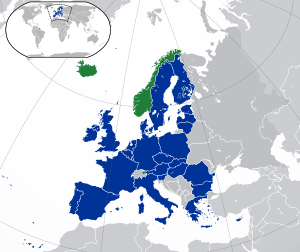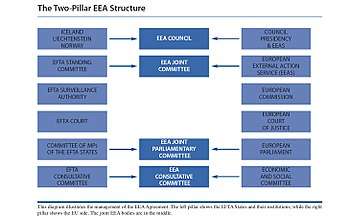European Free Trade Association Surveillance Authority
The EFTA Surveillance Authority (ESA) monitors compliance with the Agreement on the European Economic Area (EEA) in Iceland, Liechtenstein and Norway; the European Free Trade Association (EFTA) States which are a part of the EEA Agreement, allowing them to participate in the Internal Market of the European Union.

ESA operates independently of the EFTA States and seeks to protect the rights of individuals and market participants who find their rights infringed by rules or practices of the EFTA States or companies within those states. ESA monitors the timely implementation of EEA law (such as directives and regulations) by the EFTA States and may investigate whether national legislation or practices are in line with EEA law. Such an investigation may lead to the launching of formal infringement proceedings against an EFTA State, a three-step procedure which may result in ESA referring the case to the EFTA Court.
ESA is based in Brussels (Belgium) with over 70 employees of 17 different nationalities, and its working language is English. Enterprises and individuals can, however, address ESA in any official EFTA language.[1]
Establishment
The original plan for the EEA did not have the EFTA Surveillance Authority, and instead had the European Commission exercising this role. However, during the negotiations for the EEA agreement, the European Court of Justice informed the Council of the European Union by way of letter that they considered that giving the EU institutions powers with respect to non-EU member states would be a violation of the treaties, and therefore the current arrangement was developed instead.
Functions
ESA ensures that the participating EFTA States Iceland, Liechtenstein and Norway, respect their obligations under the EEA Agreement and takes on many of the roles performed by the European Commission within the EU, though only for the three EEA EFTA States and on a smaller scale. It also differs in that it does not propose new law or policy as the Commission does.[1]
The primary task of ESA is ensuring that relevant EU law is properly transposed and enforced by the EEA EFTA states. If a state fails to do so, ESA may resort to bringing the state to the EFTA Court. Secondly, ESA ensures free competition, with the power to inspect and fine companies engaging in cartels or abusing their market position. This also extends to overseeing state aid to undertakings.[1]
There are then further administrative tasks related to the approval of EFTA states decisions relating to areas such as banning harmful products or the recognition of driving licences. It also provides information and advice on interpreting and implementing the EEA agreement.[1]
ESA seeks to protect the rights of individuals and market participants who find their rights infringed by rules or practices of the EFTA States or companies within those states. Such rules or practices may, for example, be discriminatory, impose unnecessary burdens on commercial activity, or constitute unlawful state aid. ESA may in such cases initiate proceedings against the EFTA State at the EFTA Court, seeking a change in the relevant rules or practices.
ESA also enforces restrictions on state aid, assessing its compatibility with the functioning of the internal market, and has the power to order repayment of unlawful state aid.
ESA also ensures that companies operating in the EFTA countries abide by the rules relating to competition. ESA can investigate possible infringements of EEA provisions, either on its own initiative, or on the basis of complaints, and can impose fines on individual undertakings and assess mergers between undertakings where certain thresholds are met.
In monitoring and enforcing the Agreement, ESA has powers that correspond to those of the European Commission. There is close contact and co-operation between the Commission and ESA. The two institutions oversee the application of the same laws in different parts of the EEA.
ESA has been allocated with specific tasks in supervising financial services. ESA has the powers to adopt certain defined decisions that are legally binding on national supervisory authorities and market operators (including credit institutions, insurance companies and investment firms) established in the EFTA States. To ensure consistency within the entire EEA such binding decisions will be adopted on the basis of drafts from the EU European Supervisory Authorities (EBA, EIOPA and ESMA), either on the initiative of ESA or on the initiative of the relevant EU authority[2].
Relations with the Commission
The institutional framework of the EEA consists of two pillars and is thus often referred to as the “two-pillar structure”. The EU and its institutions constitute one pillar (EU bodies), while the EEA EFTA States and their institutions constitute the other pillar (EEA EFTA bodies), mirroring those of the EU. Between these two pillars, a number of joint bodies have been established. Through these joint bodies, the 31 EEA States jointly implement and develop of the EEA Agreement.

The two-pillar structure is necessary because the EEA EFTA States have not transferred any competences regarding surveillance and judicial review to the EU[3]. In addition, the EEA EFTA States are also, as a main rule, constitutionally unable to accept binding decisions made by the EU institutions – especially the European Commission and the European courts – directly. In order to apply to the EEA EFTA States, certain competences and tasks, which are carried out by bodies in the EU pillar, have to be conferred upon bodies in the EFTA pillar. That is why, pursuant to Article 108 EEA, the EEA EFTA States established the EFTA Surveillance Authority and the EFTA Court. The EFTA Surveillance Authority has been granted competences mirroring those of the Commission as regards surveillance, whilst the EFTA Court has been granted competences mirroring those of the Court of Justice of the European Union (CJEU). Due to their mirror roles and the need to ensure uniform application of law, ESA cooperates closely with the European Commission. The two bodies consult each other and exchange data; in matters of state aid and competition there is a particularly deep level of cooperation. In the event of a disagreement, negotiations are referred to an EEA Joint Committee.[1]
The EFTSA undertakes supervisory approvals in regard to major restructurings such as those resulting from the 2008–2012 Icelandic financial crisis, such as the refinancing of Iceland's Housing Financing Fund.[4]
Organisation
ESA is led by a college of three members, one from each country.[5] All decisions which formally bind ESA are taken by the College. Although College members are appointed by the Member States, they undertake their functions independently and free of political direction. All decisions which formally bind ESA are taken by the College, which usually meets once a week.
- The college currently consists of
- Bente Angell-Hansen, Norway, President
- Frank J. Büchel, Liechtenstein
- Högni S. Kristjánsson, Iceland
The College is served by four departments that form the staff of ESA: the Internal Market Affairs Directorate, the Competition and State Aid Directorate, the Legal and Executive Affairs Department and the Administration.
See also
References
- "About the EFTA Surveillance Authority". EFTA SA.
- "ESA at a glance | EFTA Surveillance Authority". EFTA Surveillance Authority. Retrieved 2018-04-17.
- "SUBCOMMITTEE V ON LEGAL AND INSTITUTIONAL QUESTIONS The two-pillar structure of the EEA Agreement – Incorporation of new EU acts" (PDF).
- OECD Economic Surveys: Iceland 2011 -OECD - 2011 Page 50 "The Housing Finance Fund (cont.).. To ensure that the HFF remained solvent, the government made a capital injection of ISK 33 billion (2.1% of 2010 GDP) at the end of 2010. The European Surveillance Authority recently approved this state ..."
- College